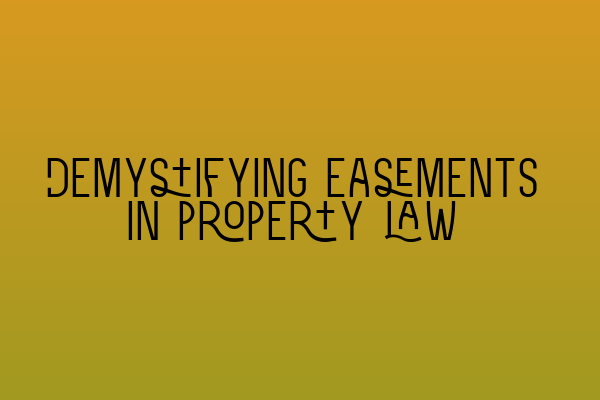Demystifying Easements in Property Law
Welcome to SQE Property Law & Land Law! As experts in the field, we understand how intricate and complex property law can be. Today, we are going to demystify one particular aspect of property law that often confuses property owners and aspiring solicitors – easements.
Now, you may be wondering, what exactly is an easement? An easement is a legal right that allows one party to use land belonging to another party for a specific purpose. In simpler terms, it grants someone the right to use a portion of someone else’s property without actually owning it. This right is legally binding and can be transferred with the land.
There are several types of easements, each with its own set of rules and regulations. Let’s dive into the most common types:
1. Right of Way: This is perhaps the most well-known easement. It grants someone the right to travel through a specific portion of another person’s land. For example, if your property is landlocked and you need to pass through your neighbor’s land to access the main road, you would have a legal right of way easement.
2. Utility Easements: These easements are granted to utility companies, such as electricity, water, or gas providers, giving them the right to install and maintain utility lines or infrastructure on another person’s property. This ensures that essential services can be provided to all properties in an area.
3. Easements by Necessity: Similar to a right of way easement, easements by necessity are granted when there is no other viable access to a property. This commonly occurs when a landlocked property needs a legal access route.
4. Easements of Support: These easements protect the structural integrity of a building or land. For example, if a building relies on the support of an adjacent property, an easement of support would grant the owner of the building the right to ensure the support is maintained.
Now that we’ve covered the basics, let’s address some frequently asked questions related to easements:
1. How are easements created?
Easements can be created in several ways, including express grant (through a written agreement), implied grant (through the actions of the parties involved), necessity, or prescription (after a certain period of continuous use).
2. Can easements be terminated?
Yes, easements can be terminated under certain circumstances. Common reasons for termination include abandonment, merger (when the same party acquires both the dominant and servient properties), or by mutual agreement between the parties involved.
3. Can an easement be enforced against subsequent property owners?
Yes, easements “run with the land,” which means they remain binding even when the property changes ownership. This ensures continuity and protects the rights of the parties involved.
Understanding easements is essential in property law, whether you are a property owner, developer, or aspiring solicitor. Having a proper grasp of easement rights and responsibilities can help you navigate potential legal issues and protect your interests.
At SQE Property Law & Land Law, we offer comprehensive preparation courses for both SQE 1 and SQE 2 exams. These courses are designed to help aspiring solicitors master the concepts and principles of property law, including easements. Check out our SQE 1 preparation courses and SQE 2 preparation courses to enhance your legal knowledge and improve your chances of success in the SRA SQE exams.
In conclusion, easements play a crucial role in property law, granting individuals important rights to use and access land. Understanding the different types of easements, how they are created, and their enforceability is vital for property owners and legal professionals alike. If you have any specific questions or need assistance with easement-related matters, our team of experienced solicitors at SQE Property Law & Land Law is here to help.
To further test your knowledge of property law, take a look at our SQE 1 practice exam questions and SQE 1 practice mock FLK1 FLK2. Stay ahead of important exam dates by referring to our comprehensive list of SRA SQE exam dates.
Thank you for joining us on this journey to demystify easements in property law. We hope this blog post has provided valuable insights and clarification on this often confusing topic. Remember, our team at SQE Property Law & Land Law is here to support you every step of the way.
